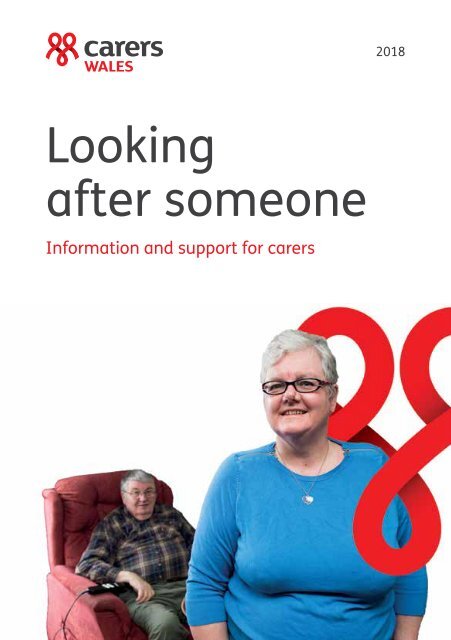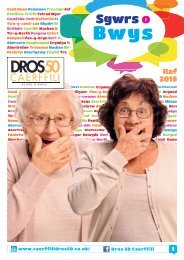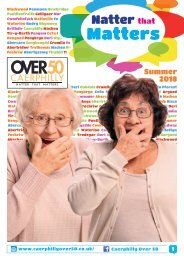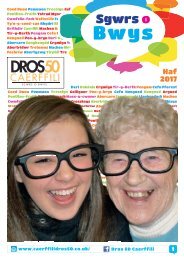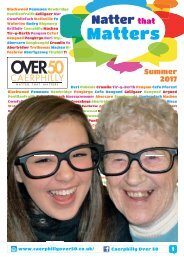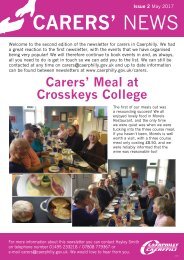Looking After Someone 2018
You also want an ePaper? Increase the reach of your titles
YUMPU automatically turns print PDFs into web optimized ePapers that Google loves.
<strong>2018</strong><br />
<strong>Looking</strong><br />
after someone<br />
Information and support for carers
Contents<br />
About this guide<br />
ABOUT THIS GUIDE<br />
A CARER’S GUIDE<br />
GETTING HELP AND SUPPORT<br />
3<br />
4<br />
10<br />
Every year in Wales 123,000 people become<br />
carers, looking after family or friends who<br />
are older, disabled or seriously ill.<br />
2<br />
Where to start<br />
Carer’s assessment<br />
Assessment for the person you care for<br />
Coming out of hospital<br />
Managing someone’s affairs<br />
Taking a break<br />
Equipment and technology<br />
YOUR FINANCES<br />
Getting information on benefits<br />
11<br />
13<br />
14<br />
15<br />
15<br />
16<br />
18<br />
20<br />
21<br />
At times, caring can be profoundly joyful. There’s nothing<br />
more natural and human than helping our loved ones get the<br />
most out of life. <br />
There’s also nothing more difficult than focusing on someone<br />
else’s needs without neglecting our own. Whether we’re<br />
caring around the clock or balancing caring with work<br />
and family life, it can be exhausting. The ‘system’ can be<br />
bewildering. The emotions can be shattering.<br />
However caring affects you, we’re here.<br />
3<br />
Carer’s Allowance<br />
Carer’s Credit<br />
Benefits for the person you care for<br />
Help with council tax<br />
Other financial help<br />
YOUR WORK<br />
Working carers<br />
Your rights in work<br />
Getting support<br />
DIRECTORY<br />
22<br />
23<br />
24<br />
25<br />
26<br />
28<br />
29<br />
30<br />
32<br />
34<br />
Carers Wales is here to give you<br />
expert information and advice,<br />
to champion your rights and to<br />
support you in looking after your<br />
loved ones without putting your<br />
own life on hold.<br />
This guide is designed to outline<br />
your rights as a carer and give an<br />
overview of the support available.<br />
Whatever challenges caring<br />
brings you, Carers Wales is<br />
in your corner.<br />
This icon means there is a Carers Wales or Carers UK factsheet available which<br />
you can download from our website or order a printed copy by contacting the<br />
Carers UK Adviceline on 0808 808 7777 or at advice@carersuk.org<br />
<strong>Looking</strong> after someone<br />
carerswales.org<br />
<strong>Looking</strong> after someone<br />
carerswales.org
A carer’s guide<br />
<strong>Looking</strong> after someone can be tough. Here is a quick guide to<br />
ten of the key challenges that caring can throw your way...<br />
2<br />
Coping with feelings of guilt<br />
When we’re looking after someone, it’s important to accept that guilt<br />
is normal and that we only feel it because we care. Being able to talk to<br />
people who understand what we’re going through and how we feel can<br />
help us handle our feelings of guilt better.<br />
1<br />
Getting the right advice and information... quickly!<br />
“<strong>After</strong> the diagnosis, I was<br />
consumed with the thought<br />
that I could have done more.<br />
Why didn’t I recognise the<br />
signs? I now accept that<br />
what has happened isn’t<br />
anyone’s fault.<br />
So now I don’t say I feel<br />
guilty, I say I feel sad – an<br />
easier emotion to cope with.”<br />
4 5<br />
Being assertive with professionals<br />
3<br />
<strong>Looking</strong> after someone will often involve dealing with several different<br />
professionals. When we feel a professional has not explained things<br />
clearly, does not see the whole picture or perhaps is not doing what they<br />
should do, it can be hard to speak up. However, that is exactly what we<br />
need to do. And this starts with valuing ourselves and our caring role.<br />
Caring can be extremely<br />
complicated, whether we’re<br />
grappling with the benefits system<br />
or considering how to pay for care.<br />
Each strand is confusing but when<br />
all the strands are tangled, it can<br />
feel bewildering. Turning to an<br />
expert can help to unravel the most<br />
complex situation.<br />
“I was on the verge of a<br />
breakdown, and my family life<br />
was almost in crisis. I contacted<br />
the Carers UK Adviceline and they<br />
gave me vital information that<br />
empowered me to challenge and<br />
win my case with my council.”<br />
“The doctors discussed<br />
his condition with me<br />
and agreed that we<br />
should implement a<br />
care plan to give dad a<br />
dignified and pain-free<br />
death. They asked if I<br />
wanted to talk to dad<br />
about it, and I did.”<br />
<strong>Looking</strong> after someone<br />
carerswales.org<br />
<strong>Looking</strong> after someone<br />
carerswales.org
4<br />
Handling difficult conversations<br />
6<br />
Noticing when we’re too stressed<br />
Even a tricky conversation with professionals can be a breeze compared<br />
to having to deal with family and friends. We may have to ask a sibling to<br />
be more supportive, remind a friend that we still exist or talk gently to a<br />
parent who doesn’t accept that they can’t live independently any longer.<br />
This takes courage, bags of patience and tact. Talking it through with<br />
people outside the situation can make a world of difference.<br />
“We put off talking<br />
about mental capacity<br />
with my grandmother.<br />
Having these difficult<br />
conversations early is far<br />
preferable to leaving it<br />
too late and having other<br />
people make decisions<br />
about the future.”<br />
Stress can alert us to<br />
potential dangers and spur<br />
us on to achieve a goal.<br />
However, sometimes the<br />
balance tips too far and<br />
the pressure becomes so<br />
intense or persistent that<br />
we may feel unable to cope.<br />
As soon as we notice it<br />
getting too much, it’s<br />
helpful to talk about how<br />
we feel rather than hoping<br />
the stress will go away.<br />
“Sometimes stress and tiredness take<br />
their toll. One night we had a fight about<br />
nothing. At the time I didn’t know what<br />
to do or where I could go for help. That’s<br />
how it feels when we’re under stress.”<br />
5<br />
6 <strong>Looking</strong> after our own health and wellbeing<br />
Making difficult decisions<br />
7<br />
7<br />
As carers, we may have immediate needs such as taking breaks, getting<br />
sleep, eating properly or exercising. We may have longer-term needs such<br />
as building fulfilling relationships, pursuing hobbies or developing careers.<br />
Caring always involves an element of putting our own needs aside.<br />
However it’s important that we look after ourselves too, so we can keep<br />
going as carers, and because we are individuals whose needs are just as<br />
valid as those of our loved ones.<br />
“I never took a break – I<br />
look back now and wish I<br />
had been stronger to let<br />
others help care for mum.<br />
<strong>After</strong> years of hardly any<br />
sleep and no break, I<br />
seem to be constantly<br />
poorly and my immune<br />
system is at a low.”<br />
There will be points when we are faced with a particularly emotional<br />
or difficult decision.<br />
Sometimes it’s a decision we have planned for, or at least held at the<br />
back of our minds. Sometimes it’s completely unexpected and leaves<br />
us feeling out of control. Where we can, thinking about decisions in<br />
advance can help us keep a cool head when it comes to the crunch.<br />
“It’s better to be prepared<br />
and to do some research<br />
about different options,<br />
even if you’re not sure<br />
what route you’ll go<br />
down. I couldn’t have<br />
selected the right care<br />
home whilst mum was in<br />
hospital, in the middle of<br />
that stressful time.”<br />
<strong>Looking</strong> after someone<br />
carerswales.org<br />
<strong>Looking</strong> after someone<br />
carerswales.org
8<br />
Keeping relationships fulfilling<br />
10<br />
Keeping a sense of humour<br />
“I was suddenly juggling hospital visits,<br />
a full-time job and trying not to scream.<br />
I remember feeling I had lost all control<br />
over my life: that stroke had happened<br />
not just to Peter, but to both of us.”<br />
Caring for our loved<br />
ones can express<br />
the best of who we<br />
are, and can take<br />
a relationship to a<br />
profound new level.<br />
It can also push us<br />
to the brink through<br />
financial, emotional<br />
and practical strain.<br />
Illness can cast aside<br />
the best-laid plans and<br />
make relationships feel<br />
utterly different. What<br />
matters most is that<br />
there’s a way for us to<br />
talk honestly and find<br />
help when we need it.<br />
Nothing relieves stress and tension better<br />
than a good laugh.<br />
Sometimes caring can feel a bit like starring<br />
in our own sitcom, and there’s no shortage<br />
of comedy material. Other times we may<br />
need a bit of help finding something to<br />
laugh about. Either way, sharing experiences<br />
with other carers is often great not just for<br />
feeling listened to and understood but for<br />
finding the humour that can keep us going.<br />
“Dementia is no laughing<br />
matter, but humour is my<br />
way of coping.<br />
I treat most of dad’s<br />
outbursts as comedy gold<br />
for the book or the sitcom<br />
I’ll never get round to<br />
writing!”<br />
8 9<br />
9<br />
Adapting to changing circumstances<br />
Whether we’re looking after<br />
someone who’s recovering<br />
or whose condition is<br />
deteriorating over time,<br />
caring inevitably involves<br />
adapting to circumstances.<br />
Sometimes it’s easy to focus<br />
on the practical details –<br />
the administration of care<br />
workers or move to the care<br />
home. Being able to stay<br />
attentive to our relationship<br />
with the person we’re caring<br />
for in the midst of all that<br />
change is far from easy.<br />
“There were times when it seemed that<br />
mum was at death’s door. But a couple of<br />
days later she was sitting up in bed, bright<br />
as a button. That really made the emotions<br />
difficult, constantly living on the edge.”<br />
Join Carers Wales for support, understanding and<br />
lasting change<br />
However caring affects you and your family, we’re here for you.<br />
By joining Carers Wales, you can be part of a supportive<br />
community and a movement for change.<br />
You can join quickly and easily by: visiting carerswales.org<br />
or calling us on 029 2081 1370<br />
@carerswales<br />
/carerswales<br />
<strong>Looking</strong> after someone<br />
carerswales.org<br />
<strong>Looking</strong> after someone<br />
carerswales.org
Where to start<br />
Getting help<br />
and support<br />
Caring can be hard work – physically and emotionally.<br />
It’s important to find out about the different ways<br />
you can get help and support with caring.<br />
One way to get help and support<br />
is through an assessment by the<br />
local authority social services<br />
department. Both you and the<br />
person you care for can get an<br />
assessment. This may result in help<br />
and support being provided to you<br />
as a carer and/or to the person<br />
you are looking after. For further<br />
information see pages 13-14.<br />
You could decide to buy in<br />
additional help and support for<br />
10 the person you are looking after. – see page 15.<br />
11<br />
You could decide to employ an<br />
individual or use a care provider<br />
such as a care agency.<br />
If you are looking for care providers<br />
you could:<br />
• ask the local authority if they<br />
have a list of approved care<br />
providers<br />
• search on the Care and Social<br />
Services Inspectorate Wales<br />
website: cssiw.org.uk<br />
• search on the Which? Elderly<br />
Care directory:<br />
which.co.uk/elderly-care/<br />
care-services-directory<br />
You can also find out about<br />
equipment and technology that<br />
could help make your home<br />
safer, your life easier and provide<br />
independence for the person you<br />
are looking after – see page 18.<br />
Caring inevitably means adapting<br />
to changing circumstances, so it’s<br />
important to think about the future.<br />
You may need to look into different<br />
ways of managing someone’s<br />
affairs, either now or for the future<br />
You could find out if you have a<br />
local carers organisation, and if so<br />
what support they offer to carers in<br />
the area. To find your local carers<br />
organisation visit<br />
carersuk.org/localsupport<br />
<strong>Looking</strong> after someone<br />
carerswales.org<br />
<strong>Looking</strong> after someone<br />
carerswales.org
Alex’s story<br />
Carer’s assessment<br />
Alex cared for his mother who<br />
had mental health needs and an<br />
aggressive form of lung cancer<br />
until she passed away. He still<br />
cares for his dad and has found<br />
Carers UK’s forum a real source<br />
of support.<br />
I gradually realised that my<br />
mum’s care needs were becoming<br />
quite severe. My dad was also<br />
becoming more frail and I became<br />
involved in everything for them. I<br />
lived just around the corner so I<br />
was there to make appointments,<br />
transport them to appointments,<br />
make sure my mum took the<br />
right medication and I was a<br />
source of emotional support and<br />
encouragement.<br />
Both of my parents have been<br />
reluctant to source help from<br />
elsewhere – the more I did, the<br />
more they wanted from me and<br />
I’ve found it hard to step back over<br />
Upfront is a free online tool that can help you<br />
get straight to the information you need.<br />
Visit carersuk.org/upfront to give it a go!<br />
the years. I had a lot of guilt if I<br />
rushed their care, but also wanted<br />
to get in and out as quickly as<br />
possible.<br />
The first time I posted on the Carers<br />
UK forum I was at rock bottom. I<br />
logged in the next day to read the<br />
replies and I was blown away. It<br />
felt like I had a team of therapists<br />
If you are a carer who appears to have a need for<br />
support you should be offered a carer’s assessment by<br />
the local authority of the person you are looking after.<br />
If you are not offered a carer’s<br />
assessment, you should contact<br />
the local authority and ask for one.<br />
You can have an assessment no<br />
matter what your level of need,<br />
the amount of care you provide or<br />
your financial means. Your carer’s<br />
assessment should cover:<br />
• your caring role and how it<br />
affects your life and wellbeing<br />
• your feelings and choices about<br />
caring<br />
authority is one which does charge<br />
12 on tap and I’ll never forget that.<br />
• your health<br />
for carer support - not all do), or 13<br />
You can spill your guts out and<br />
• work, study, training, leisure the financial situation of the person<br />
there’s no need to wear your<br />
you are looking after (if services are<br />
‘social mask’, people give a mix of<br />
• relationships, social activities and<br />
provided to them).<br />
emotional support and practical<br />
your goals<br />
advice, but no one glosses over<br />
• housing<br />
how hard caring can be.<br />
• planning for emergencies<br />
(such as carer emergency card<br />
schemes).<br />
Following the assessment the<br />
local authority will decide if you<br />
are eligible for support. This can<br />
be provided either to you, or to<br />
the person you are looking after to<br />
reduce the impact of caring on you.<br />
Support could be provided by the<br />
local authority, or in the form of a<br />
direct payment.<br />
Some examples of the kind of<br />
support you could get include;<br />
driving lessons, taxi fares, a laptop,<br />
help with housework or gardening<br />
or a gym membership.<br />
Whether the local authority will<br />
pay for any support will depend on<br />
your financial situation (if the local<br />
Even if you are not considered to<br />
be eligible for support the local<br />
authority must provide you with<br />
information and advice on local<br />
services to prevent your needs from<br />
developing further.<br />
Find out more at<br />
carersuk.org/wales/<br />
assessment<br />
<strong>Looking</strong> after someone<br />
carerswales.org<br />
<strong>Looking</strong> after someone<br />
carerswales.org
Assessment for the person you care for<br />
Coming out of hospital<br />
If the person you are looking after is an adult and<br />
appears to have a need for support they should be<br />
offered a needs assessment by their local authority.<br />
Deciding to care, or continue caring, for someone<br />
who is coming out of hospital can be very difficult.<br />
The person you are looking after<br />
can have an assessment no matter<br />
their level of need or their financial<br />
means.<br />
The assessment will look at their<br />
physical, mental and emotional<br />
needs. You as a carer are entitled to<br />
be involved in the assessment.<br />
Following the assessment, the<br />
Find out more at<br />
local authority will decide whether<br />
carersuk.org/wales/hospital<br />
Even if the person you are looking<br />
the person you are looking after is<br />
after is not considered to be eligible<br />
eligible for support. Support could<br />
14 for support, the local authority<br />
15<br />
be provided by the local authority,<br />
or in the form of a direct payment.<br />
Some examples of the kind of<br />
support the person you are looking<br />
after could get include; changes<br />
to their home to make it more<br />
suitable, a care worker, a place at<br />
a day centre or a temporary stay in<br />
residential care.<br />
Whether the local authority will<br />
pay for any support provided will<br />
depend on the financial situation<br />
of the person you are looking<br />
after, unless the support is of<br />
a type which must be provided<br />
free of charge, such as aids or<br />
minor adaptations (which means<br />
adaptations up to the value of<br />
£1,000).<br />
must still provide them with<br />
information and advice.<br />
Find out more at<br />
carersuk.org/walesassessment<br />
It is important to remember that<br />
it is your choice whether or not to<br />
take on a caring role.<br />
Before the person you are looking<br />
after comes home from hospital<br />
a discharge assessment should<br />
be carried out to see whether<br />
they need any support once they<br />
are discharged. This discharge<br />
assessment should look at whether<br />
the person you are looking after<br />
is eligible for; any intermediate or<br />
reablement care, NHS continuing<br />
Managing someone’s affairs<br />
healthcare or NHS-funded nursing<br />
care, other NHS services and/or<br />
community care services from the<br />
local authority.<br />
You should also be offered a carer’s<br />
needs assessment to see whether<br />
you as a carer need support once<br />
the person you are looking after is<br />
discharged.<br />
You may want to help manage the affairs of the<br />
person you are looking after, or may want to know<br />
how to plan for doing this in the future.<br />
There are different ways of<br />
managing someone’s affairs<br />
depending on whether the person<br />
you are looking after can currently<br />
make decisions for themselves<br />
(which is called having mental<br />
capacity) or whether they are<br />
unable to make decisions for<br />
themselves (which is called lacking<br />
mental capacity).<br />
Find out more at carersuk.org/<br />
managing-someones-affairs<br />
<strong>Looking</strong> after someone<br />
carerswales.org<br />
<strong>Looking</strong> after someone<br />
carerswales.org
Taking a break<br />
Linda’s story<br />
Caring for someone can be a full-time job so breaks<br />
are vital to your own wellbeing and quality of life.<br />
There are different ways in which<br />
you may take a break as a carer.<br />
Only you will know what type of<br />
break is best for you. You may need<br />
an hour each week, a day here and<br />
there, a week or two for a holiday,<br />
or a combination of all of these.<br />
You do find yourself slightly<br />
isolated as a carer. I have friends,<br />
but often Charles’ day-to-day<br />
needs transcend my own, so I can<br />
be an unreliable friend.<br />
Think about the kind of break that<br />
If you want to go on holiday, either<br />
you need as a carer and what kind<br />
alone or with the person you are<br />
As his carer I do a whole host of<br />
of alternative care the person you<br />
looking after, there may be some<br />
things to help him throughout the<br />
are looking after needs.<br />
help you could get towards the<br />
day – from making sure he takes<br />
There are different options for cost. You could see if there are any<br />
his medication and doing his dinner<br />
getting alternative care (often local grants or schemes to help<br />
to getting him to his different That said, it’s not the long breaks<br />
16 called respite care) for the person carers with the cost of a holiday<br />
hospital appointments. In Neath that I look forward to, my main 17<br />
you are looking after whilst you<br />
take a break:<br />
• getting help from the local<br />
authority social services<br />
department via assessments<br />
(see pages 13–14)<br />
“Catch up on sleep and give<br />
yourself time to think. When<br />
you’re caring there are often<br />
complex emotions to deal<br />
with and feelings of loss.<br />
There is no right way to use<br />
your time, just be gentle on<br />
yourself.”<br />
• arranging care yourself<br />
(see page 11)<br />
• support from friends or family<br />
• some organisations provide<br />
break services for carers or for<br />
the person being looked after<br />
(or both).<br />
and you could have a look through<br />
the list of organisations in our<br />
taking a break factsheet.<br />
Find out more at<br />
carersuk.org/break<br />
“It took years before I was<br />
able to consider respite for my<br />
daughter. Eventually after a<br />
difficult episode I gave in and<br />
accepted. Years on I now know I<br />
need that complete break each<br />
year. I come back recharged<br />
and more able to cope.”<br />
Linda cares for her husband,<br />
Charles, who has dementia and<br />
diabetes. Linda’s local carers’<br />
service runs a sitting service, when<br />
volunteers will go and sit with<br />
Charles for a few hours so that<br />
Linda can do something for herself.<br />
Port Talbot the carers’ service has<br />
created the sitting service, when a<br />
volunteer will come in to sit with<br />
Charles for an hour or so at a time.<br />
They don’t do any caring activities,<br />
but keep him company and put my<br />
mind at ease that there’s someone<br />
there making sure nothing is going<br />
wrong.<br />
The service helps me pop out every<br />
now and again, even if it’s just to<br />
go to the doctors myself or for a<br />
haircut.<br />
Like many other patients my<br />
husband doesn’t really like respite.<br />
Luckily, over the years we’ve had a<br />
friend that manages to come and<br />
look after him if I’m away for longer<br />
periods. That really works for us as<br />
I can take a break knowing that<br />
Charles is getting the care he needs,<br />
the way he likes it.<br />
break is my garden, it’s the perfect<br />
escape. I’m within shouting<br />
distance if Charles is inside the<br />
house and I can have my mobile<br />
phone on me while I’m pottering<br />
around should there be an<br />
emergency. When the weather gets<br />
nice Charles can come outside and<br />
talk to me as I garden. I’m always<br />
there, still caring, but I’m away and<br />
taking some time for myself at the<br />
same time.<br />
If you need advice and information about taking a break,<br />
download our factsheet at carersuk.org/break or contact the<br />
Carers UK Adviceline on 0808 808 7777 or at advice@carersuk.org<br />
<strong>Looking</strong> after someone<br />
carerswales.org<br />
<strong>Looking</strong> after someone<br />
carerswales.org
Equipment and technology<br />
Olga’s story<br />
Different types of equipment, adaptations and technology<br />
could help make your home safer, your life easier and provide<br />
independence for the person you are looking after.<br />
Equipment could be purchased<br />
privately or you might be able to<br />
get help with the cost through the<br />
NHS or through assessments from<br />
the local authority, if they consider<br />
that the person you are looking<br />
after needs such equipment.<br />
Telehealth is a way of monitoring a<br />
person’s health remotely, through<br />
When I first heard about information once and all of us<br />
equipment they have in their home.<br />
Carers UK’s Jointly app, I was had access to it. Up until then<br />
Adaptations can be paid for<br />
It can monitor conditions such as<br />
juggling full-time work with caring we’d been trying to coordinate<br />
privately, or you could see if you asthma, heart failure, diabetes,<br />
for my parents. I was living in everything through email, phone<br />
or the person you are looking after chronic obstructive pulmonary<br />
London – 170 miles away from their calls and trying to share calendars.<br />
can apply for a disabled facilities disease (COPD), stroke and<br />
home in Staffordshire.<br />
Each time one of us took mum<br />
grant.<br />
hypertension.<br />
It was a complicated and stressful or dad to an appointment we<br />
18 situation. My mum has a range of<br />
19<br />
Local Care and Repair agencies<br />
across Wales also help<br />
homeowners and private tenants<br />
to repair, adapt and maintain their<br />
homes – see page 34.<br />
Telecare and telehealth use<br />
technology to help people to live<br />
independently in their own homes<br />
and give you, the carer, peace of<br />
mind.<br />
Telecare consists of a range of<br />
unobtrusive monitoring technology<br />
such as sensors positioned<br />
throughout the home which can<br />
detect if there is a problem, such<br />
as a gas leak or fire, or if the person<br />
you look after has a problem and<br />
needs assistance. It also includes<br />
wearable technology that can<br />
detect falls and locate a person if<br />
they have wandered.<br />
Everyday technology such as the<br />
internet or your mobile phone can<br />
take the stress out of a whole host<br />
of tasks such as shopping and<br />
coordinating care for the person<br />
you look after and can help with<br />
condition self management.<br />
Find out more at<br />
carersuk.org/tech<br />
conditions, including osteoporosis<br />
and arthritis. My dad had been<br />
caring for her, until 2015 when he<br />
was diagnosed with lymphoma and<br />
needed care himself.<br />
My siblings and I tried to coordinate<br />
it between us, taking turns to travel<br />
to their home to help around the<br />
house, cook meals and take them<br />
to appointments.<br />
Jointly was an excellent way<br />
of making sure we had all the<br />
information we needed in one<br />
place. We only had to enter the<br />
Developed by Carers UK, Jointly is an innovative<br />
mobile and online app that is designed by carers<br />
for carers. Find out more at carersuk.org/jointly<br />
would make notes in Jointly. The<br />
medication list meant we all had<br />
up-to-date information to share<br />
with the GP – which was essential<br />
when dad was prescribed aspirin,<br />
which he wasn’t allowed to have<br />
whilst on his cancer drugs.<br />
Being able to look after my parents<br />
has been really important to me. I<br />
wanted to return the care and love<br />
they gave me during my childhood.<br />
<strong>After</strong> dad passed away in 2016, my<br />
siblings and I have continued to<br />
share the care for mum, and<br />
Jointly helps us do that.<br />
<strong>Looking</strong> after someone<br />
carerswales.org<br />
<strong>Looking</strong> after someone<br />
carerswales.org
Your<br />
finances<br />
Getting information on benefits<br />
The benefits system is complicated. It is a good idea to get<br />
a benefit check to make sure you and the person you are<br />
looking after are claiming all the benefits you are entitled to.<br />
As well as increasing your<br />
household income, benefits can<br />
sometimes help protect your State<br />
Pension entitlement in the future.<br />
The Carers UK website covers the<br />
main conditions for each benefit.<br />
Find out more at<br />
carersuk.org/benefits<br />
You may be able to get a face-toface<br />
benefit check from a local<br />
The Carers UK Adviceline can carry<br />
out a benefit check for you –<br />
advice centre such as; your local<br />
email advice@carersuk.org or call<br />
Citizens Advice Bureau, Age Cymru,<br />
0808 808 7777.<br />
20 carers organisation or disability 21<br />
charity.<br />
You can get a benefit check online.<br />
It will take about 20 minutes to<br />
complete.<br />
Visit entitledto.co.uk/<br />
benefits-calculator or<br />
turn2us.org.uk/<br />
find-benefits-grants<br />
These online tools are not suitable<br />
for everyone. Special rules apply<br />
to some groups of people, for<br />
example: students, people under<br />
18, people in permanent residential<br />
care, UK nationals who live abroad<br />
and people who are not British or<br />
Irish citizens.<br />
<strong>Looking</strong> after someone<br />
carerswales.org<br />
<strong>Looking</strong> after someone<br />
carerswales.org
Carer’s Allowance<br />
Carer’s Credit<br />
If you’re looking after a family member or<br />
friend, you may be entitled to Carer’s Allowance.<br />
You may be eligible for Carer’s<br />
Allowance if you meet all of the<br />
following conditions:<br />
• you look after someone who<br />
gets a qualifying disability<br />
benefit - this includes the middle<br />
or the higher rate of the care<br />
component of Disability Living<br />
Allowance (DLA), either rate of<br />
the daily living component of<br />
Personal Independence Payment<br />
(PIP), either rate of Attendance<br />
Allowance, Constant Attendance<br />
Carer’s Credit is a way of protecting your State Pension rights<br />
if you are looking after someone but are not paying National<br />
Insurance contributions through paid work and are unable to<br />
claim Carer’s Allowance.<br />
You do not get paid any money if<br />
you claim Carer’s Credit, but you get<br />
a National Insurance contribution<br />
credit to help protect your record<br />
(which helps to protect your<br />
entitlement to a State Pension).<br />
If you already get Carer’s Allowance<br />
then you do not need to claim<br />
Carer’s Credit as your record is Carer’s Credit can also help with<br />
already protected.<br />
breaks in your caring role. You can<br />
22<br />
Allowance (at a certain level) Claiming Carer’s Allowance can<br />
To claim Carer’s Credit you need<br />
claim Carer’s Credit for any week<br />
within 12 weeks before the date 23<br />
and Armed Forces Independence<br />
Payment (AFIP)<br />
• you look after that person for at<br />
least 35 hours a week<br />
• you are aged 16 or over<br />
• you are not in full-time education<br />
• you don’t earn over £116 a week<br />
(after deductions)<br />
• you satisfy UK presence and<br />
residence conditions.<br />
If you are getting certain other<br />
benefits, including a State Pension,<br />
then you might not be able to be<br />
paid Carer’s Allowance at the same<br />
time.<br />
However, it might still be useful to<br />
make a claim and receive what is<br />
called the ‘underlying entitlement’<br />
to Carer’s Allowance, even though<br />
you won’t be paid the benefit itself.<br />
This is because this ‘underlying<br />
entitlement’ to Carer’s Allowance<br />
can help to increase any meanstested<br />
benefits you might be<br />
getting (such as Pension Credit,<br />
Housing Benefit and Council Tax<br />
Reduction), or it could mean that<br />
you become entitled to meanstested<br />
benefits for the first time.<br />
sometimes have an impact on<br />
other benefits you receive, but this<br />
shouldn’t put you off thinking about<br />
making a claim, as it can often<br />
increase your household income<br />
overall.<br />
Claiming Carer’s Allowance never<br />
reduces the amount of Disability<br />
Living Allowance (DLA), Personal<br />
Independence Payment (PIP),<br />
Attendance Allowance or State<br />
Pension that the person you are<br />
looking after gets. However it can<br />
sometimes affect any meanstested<br />
benefits they get.<br />
Find out more at<br />
carersuk.org/carersallowance<br />
to be looking after someone for a<br />
total of 20 hours or more a week.<br />
The person you are looking after<br />
must normally be getting one of<br />
the following:<br />
• the middle or the higher rate of<br />
the care component of Disability<br />
Living Allowance (DLA)<br />
• either rate of the daily living<br />
component of Personal<br />
Independence Payment (PIP)<br />
• either rate of Attendance<br />
Allowance<br />
• Constant Attendance Allowance<br />
• Armed Forces Independence<br />
Payment (AFIP).<br />
However, if the person you are<br />
looking after doesn’t get one of<br />
these benefits, you may still be<br />
able to get Carer’s Credit. When you<br />
apply, fill in the Care Certificate part<br />
of the application form and get a<br />
health or social care professional to<br />
sign it.<br />
you become entitled to Carer’s<br />
Allowance or following the week<br />
you stop being entitled to Carer’s<br />
Allowance. This is without meeting<br />
the 20-hour condition. This means<br />
you could have a break in caring for<br />
up to 12 weeks without losing your<br />
National Insurance contribution<br />
credit.<br />
Find out more at<br />
carersuk.org/carerscredit<br />
<strong>Looking</strong> after someone<br />
carerswales.org<br />
<strong>Looking</strong> after someone<br />
carerswales.org
Disability benefits for the<br />
person you are looking after<br />
The person you are looking after may be<br />
entitled to disability benefits to help pay for the<br />
extra costs of long-term illness or disability.<br />
Disability benefits are not<br />
dependent on how much money<br />
the person you are looking after<br />
has, and they are not based on<br />
their National Insurance record.<br />
However, there are conditions they<br />
would have to meet in order to<br />
receive one of these.<br />
Help with council tax<br />
If you’re caring for someone you may be<br />
able to get help with your council tax bill.<br />
Council Tax Reduction (sometimes<br />
called Council Tax Support) is a<br />
scheme run by local authorities to<br />
help those on a low income with<br />
their council tax bill.<br />
There are a number of<br />
circumstances in which properties<br />
can be exempt from council tax.<br />
These are the ones that may be<br />
particularly relevant to you as a<br />
carer:<br />
Disability Living Allowance (DLA)<br />
• if you have left the property<br />
empty and it is no longer your You may be able to pay less council<br />
If you are looking after a child component which may be awarded<br />
24<br />
main residence because you tax under the disability reduction<br />
under 16 then you could claim<br />
25<br />
if they need help getting around.<br />
are providing personal care to<br />
someone<br />
DLA for them. DLA has a care<br />
component which may be awarded<br />
if the child needs help with<br />
personal care (such as dressing,<br />
washing or using the toilet) or<br />
supervision to make sure they are<br />
safe, because of their illness or<br />
disability. The help the child needs<br />
must be substantially more than<br />
the help needed by a child of the<br />
same age without the illness or<br />
disability. DLA also has a mobility<br />
component which may be awarded<br />
if the child needs help getting<br />
around.<br />
Find out more at<br />
carersuk.org/dla<br />
Personal Independence Payment<br />
(PIP)<br />
If you are looking after someone<br />
aged between 16 and 64 then<br />
they could claim PIP. PIP has a<br />
daily living component which<br />
may be awarded if they need help<br />
with daily living activities, such<br />
as dressing, washing or using<br />
the toilet. PIP also has a mobility<br />
Find out more at<br />
carersuk.org/pip<br />
Attendance Allowance<br />
If you are looking after someone<br />
aged 65 or over then they could<br />
claim Attendance Allowance.<br />
Attendance Allowance may be<br />
awarded if they need help with<br />
personal care (such as dressing,<br />
washing or using the toilet), or<br />
supervision to make sure they are<br />
safe.<br />
Find out more at<br />
carersuk.org/<br />
attendanceallowance<br />
• if the only person(s) living in the<br />
property are severely mentally<br />
impaired and no one else could<br />
be liable to pay the council tax<br />
• if the property has been left<br />
empty by someone who is now<br />
resident in a hospital, a care<br />
home or a hostel where personal<br />
care is provided.<br />
There are sometimes discounts<br />
you can get on the council tax<br />
bill. If only one person lives in the<br />
property a 25% discount can be<br />
applied to the bill; and if no-one<br />
lives in the property a 50% discount<br />
can be applied to the bill. Certain<br />
people, including some carers<br />
and people with a severe mental<br />
impairment, are not counted when<br />
the council works out how many<br />
people live in a property.<br />
scheme if your home has had<br />
work carried out on it to help you<br />
or someone else living with a<br />
disability.<br />
Find out more at<br />
carersuk.org/counciltax<br />
<strong>Looking</strong> after someone<br />
carerswales.org<br />
<strong>Looking</strong> after someone<br />
carerswales.org
Other financial help<br />
There are other ways you may be able to get help with your<br />
household finances - such as help with fuel costs, help with<br />
health costs, or by applying for certain loans or grants.<br />
Help with fuel costs<br />
There are a number of ways you<br />
can get help with fuel costs:<br />
• if you have reached the<br />
qualifying age you may be<br />
entitled to a Winter Fuel<br />
Payment to help pay winter<br />
bills – this can be between £100<br />
to £300 depending on your<br />
circumstances<br />
• if you’re receiving certain<br />
26<br />
benefits you may be able to for treatment for you or your child.<br />
get a Cold Weather Payment You can also claim for the fares of<br />
27<br />
of £25 for each week between a companion who needs to travel<br />
1 November and 31 March in with you for medical reasons.<br />
which the average temperature<br />
If you are aged 60 and over, you<br />
in your local area is at or below<br />
can get free prescriptions and NHS<br />
freezing over seven consecutive<br />
eye tests regardless of your income.<br />
days<br />
Quotes from the Carers UK Adviceline<br />
• if you meet certain conditions<br />
you may get help to pay for<br />
energy efficiency improvements<br />
through the the government’s<br />
Affordable Warmth Scheme. The<br />
scheme provides a package of<br />
energy-efficiency and heating<br />
measures, tailored to each<br />
household.<br />
Find out more at carersuk.org/fuel<br />
Help with NHS health costs<br />
In Wales all prescriptions are free of<br />
charge.<br />
If you are getting certain benefits<br />
you may qualify for help with<br />
NHS health costs. This includes<br />
free prescriptions, free dental<br />
treatment, free NHS eye tests<br />
and vouchers to help pay for<br />
glasses/contact lenses, as well as<br />
reimbursement of fares to hospital<br />
If you aren’t getting benefits which<br />
entitle you to help with NHS health<br />
costs, but you have a low income,<br />
you may be able to get help with<br />
health costs through the NHS Low<br />
Income Scheme.<br />
Prepayment certificates for<br />
prescriptions can also reduce costs<br />
if you regularly pay for medication.<br />
Find out more at<br />
carersuk.org/healthcosts<br />
Budgeting Loan<br />
If you are getting certain benefits<br />
you may be able to get a Budgeting<br />
Loan to help pay for essential<br />
things like rent, furniture, clothes or<br />
hire purchase debts.<br />
The smallest amount you can<br />
borrow is £100. Budgeting Loans<br />
are interest free so you only<br />
pay back what you borrow. You<br />
normally have to repay the loan<br />
within 104 weeks.<br />
Find out more at<br />
gov.uk/budgeting-help-benefits<br />
Thank you so much for your<br />
email, there was lots of good<br />
information in there for me. I<br />
would like to thank you personally<br />
for the support and your care for<br />
people like myself. You’re a star<br />
and once again thank you from<br />
the bottom of my heart, it’s good<br />
to know there are people who<br />
can help me and my dad in<br />
times like these.<br />
Discretionary Assistance Fund<br />
In Wales there is a single national<br />
welfare assistance scheme called<br />
the Discretionary Assistance<br />
Fund which includes Individual<br />
Assistance Payments and<br />
Emergency Assistance Payments.<br />
The Money Made Clear website<br />
has further information:<br />
moneymadeclearwales.org<br />
Grants<br />
There are sometimes grants that<br />
you may be able to apply for. You<br />
can ask a local advice centre if<br />
there are any local grants. Turn 2<br />
Us is a charity which has a grants<br />
search tool. Find out more at<br />
turn2us.org.uk<br />
Thank you so much for<br />
all your help and advice I am<br />
so grateful. It has been a big<br />
decision to give up my job to<br />
become a carer but it’s definitely<br />
the right thing to do. Thank<br />
you for all the useful contact<br />
information in this email. Have<br />
a lovely weekend and please do<br />
contact me for feedback about<br />
the quality of your service, you<br />
are an amazing source of<br />
support.<br />
<strong>Looking</strong> after someone<br />
carerswales.org<br />
<strong>Looking</strong> after someone<br />
carerswales.org
Working carers<br />
Your work<br />
If you are juggling work with caring for family or<br />
friends, you are not alone – there are three million<br />
working carers in the UK.<br />
There are rights you have in work<br />
which might help you to juggle<br />
work and care (see pages 30–31).<br />
As well as these statutory rights,<br />
you may also have additional<br />
contractual rights.<br />
In addition to your rights at work,<br />
there might be other ways to make<br />
juggling work and care easier, such<br />
as accessing relevant support at<br />
work (see page 32), or outside of<br />
your employment.<br />
You could also get a benefit check<br />
28 from the Carers UK Adviceline 29<br />
If you are struggling to juggle work<br />
and care and are thinking of leaving<br />
work it is important to consider<br />
the full implications it could have<br />
on your income, quality of life and<br />
future pension entitlements.<br />
You could think about whether<br />
there is anything you can do to<br />
make it easier to juggle work and<br />
care such as getting help and<br />
support (see pages 10–19), seeing<br />
whether there are any rights you<br />
have at work which could help your<br />
caring role (see pages 30–31), and<br />
seeing if there is any additional<br />
support available which could help<br />
(see page 32).<br />
to find out what your financial<br />
situation would look like if you were<br />
to leave work or reduce your hours<br />
(see page 21).<br />
Find out more at carersuk.org/work<br />
<strong>Looking</strong> after someone<br />
carerswales.org<br />
<strong>Looking</strong> after someone<br />
carerswales.org
Your rights in work<br />
Juggling work and care can be very challenging.<br />
It’s important to find out about your rights and<br />
about any support that is available.<br />
Your rights at work come from two<br />
sources:<br />
• the law gives you ‘statutory<br />
rights’ which everyone has<br />
• your contract of employment<br />
gives you ‘contractual rights’,<br />
which can be more generous<br />
than statutory rights.<br />
The following information is<br />
about statutory rights. However • shift work.<br />
it is always worth checking your The Equality Act 2010 provides<br />
• to deal with an incident involving Visit carersuk.org/work to read our<br />
contract of employment, staff carers with protection from some<br />
a child during school hours. online information.<br />
30 31<br />
handbook or letter of appointment<br />
to see if you have any contractual<br />
rights on top of your statutory<br />
rights.<br />
All employees have a right to<br />
request flexible working after<br />
they have worked for the same<br />
employer for 26 weeks (six<br />
months), as long as they haven’t<br />
already made a flexible working<br />
request within the last 12 months.<br />
Employers can only refuse requests<br />
for certain specified reasons.<br />
Examples of flexible working<br />
include:<br />
• home working<br />
• part-time working<br />
• term-time working<br />
• flexitime<br />
• working compressed hours<br />
• job sharing<br />
forms of discrimination. For<br />
example, employers and providers<br />
of goods and services must<br />
not treat carers less favourably<br />
than those without caring<br />
responsibilities.<br />
All employees have the right to<br />
take a ‘reasonable’ amount of time<br />
off work to deal with an emergency<br />
or an unforeseen matter involving<br />
a dependent (which includes<br />
your partner, child or parent, or<br />
someone living with you as part of<br />
your family – others who rely on<br />
you for help in an emergency may<br />
also qualify).<br />
The time off is unpaid unless your<br />
employer is willing to give paid time<br />
off as a contractual right.<br />
Examples of emergency situations:<br />
• a disruption or breakdown in care<br />
arrangements<br />
• the death of a dependant<br />
• if a dependant falls ill, has been<br />
assaulted or is in an accident<br />
• to make longer term<br />
arrangements for a dependant<br />
who is ill or injured (but not to<br />
provide long term care yourself)<br />
“I care for my daughter and work<br />
part time. It’s the only break I<br />
get from my caring role. It’s a<br />
struggle to organise, especially<br />
in school holidays, but I enjoy<br />
getting out of the house and<br />
talking to the customers.”<br />
“I applied to reduce my working<br />
hours from five to four days<br />
a week, on flexible working<br />
grounds. It’s hard work, but does<br />
mean I can fit in appointments<br />
and care meetings on my day off.”<br />
If you have worked for the same<br />
employer for 12 months and you<br />
are responsible for a child aged<br />
under 18, you are entitled to 18<br />
weeks parental leave per child,<br />
which must be taken by the child’s<br />
18th birthday.<br />
This time off is unpaid unless your<br />
employer is willing to give paid time<br />
off as a contractual right.<br />
“I care for my wife, who has<br />
MS and epilepsy. We have<br />
paid care workers coming<br />
in to help, which means I<br />
am able to work full time.<br />
However, when my wife has a<br />
bad episode the whole routine<br />
falls down.<br />
My employer supports me<br />
with a great deal of flexibility.<br />
When an emergency does<br />
happen, it is ‘don’t worry<br />
about work’. However, I<br />
quickly use up my annual<br />
leave because of caring, and<br />
unpaid leave isn’t an option.”<br />
<strong>Looking</strong> after someone<br />
carerswales.org<br />
<strong>Looking</strong> after someone<br />
carerswales.org
Getting support<br />
Simon’s story<br />
Telling your employer that you are a carer<br />
is not always an easy step.<br />
Ask your employer if they have a<br />
carers policy or another policy that<br />
could support you as a carer, such<br />
as special leave.<br />
Some companies operate<br />
counselling services and have This could also include speaking<br />
By the end, Bryan needed full My manager was amazing.<br />
advice packs for carers. Trade to others who know what you are<br />
support, from feeding through to He helped me with work<br />
unions can also be a good source going through.<br />
personal care. Part of my caring priorities, being flexible and very<br />
of support. You may find that<br />
role also consisted of looking understanding when the request<br />
A local carers organisation may<br />
your colleagues are supportive, or<br />
after Lynn through the extremely would come through at extremely<br />
have support groups – visit<br />
even in similar caring situations<br />
tough times we went through. The short notice for me to be away<br />
carersuk.org/localsupport to find a<br />
themselves.<br />
amount of support offered by the from work. People in the team<br />
carer’s centre in your area.<br />
health service sometimes lacked supported me with my workload<br />
As well as seeing if there is any<br />
Our online forum may be a good<br />
coordination and we often ended and others in the business were a<br />
32 support available to carers through<br />
up in A&E with Bryan.<br />
good sounding board!<br />
33<br />
your employment, you could<br />
explore the support available<br />
outside of your employment.<br />
This could include getting a carer’s<br />
assessment to see if there is any<br />
support the local authority can<br />
offer to help you juggle work and<br />
care – see page 13.<br />
place to speak to other carers<br />
about how you are feeling – visit<br />
carersuk.org/forum.<br />
Simon and his fiancée, Lynn,<br />
cared for her father, Bryan until he<br />
passed away this year, aged 86.<br />
His employer, Nutricia, has a Carers<br />
Policy in place, allowing Simon to<br />
receive the help and support he<br />
needed to balance his work life<br />
with caring for his father-in-law.<br />
The situation started to impact me<br />
at work, long waits in A&E meant<br />
that I couldn’t always make it into<br />
work. But I became more open<br />
about what was happening at<br />
home, I shared my experience with<br />
my manager and I slowly found<br />
other people around the business<br />
that had had similar experiences.<br />
I feel very fortunate to be in a<br />
workplace where such support is<br />
available and feel for those that<br />
don’t. Thanks to having so much<br />
help from my employer, I was, in<br />
turn, able to give Lynn some of the<br />
support she needed while her<br />
father’s health deteriorated.<br />
Carers UK runs Employers for<br />
Carers, providing practical<br />
advice and resources to help<br />
employers support the carers in<br />
their workforce. You could talk<br />
to your employer about joining<br />
Employers for Carers – find out<br />
more at employersforcarers.org<br />
Caring is part of all of our lives – whether we’re caring for others<br />
or needing care ourselves. As an employer, we are committed to<br />
supporting our colleagues who have caring responsibilities.<br />
We are proud to work with Carers UK to help highlight the importance<br />
of good nutrition for carers, and to support Carers Rights Day –<br />
helping Carers UK reach more carers with information and advice.<br />
– Filippo Della Torre, General Manager, Nutricia<br />
Advanced Medical Nutrition, UK and Ireland<br />
<strong>Looking</strong> after someone<br />
carerswales.org<br />
<strong>Looking</strong> after someone<br />
carerswales.org
Directory<br />
There are a range of national organisations that can<br />
provide help. We’ve listed some of these below.<br />
Carers UK Adviceline<br />
Caring can present all kinds of challenges, from filling in<br />
forms to coping with emotions. We’re here for you with<br />
advice, information and support every step of the way.<br />
T 0808 808 7777 E advice@carersuk.org Open Mon–Fri, 10am to 4pm<br />
There are also many support groups and organisations locally<br />
that can provide help. Visit carersuk.org/localsupport to see<br />
what is available where you live.<br />
Alzheimer’s Society<br />
Information and advice for people Local offices for advice/<br />
with dementia and their carers. representation on benefits, debt<br />
Independent Age<br />
Relate<br />
T 0300 222 11 22<br />
and housing.<br />
Information and advice for older Counselling and support services for<br />
alzheimers.org.uk<br />
citizensadvice.org.uk<br />
people, their families and carers. couple, families and young people.<br />
T 0800 319 6789<br />
T 0300 100 1234<br />
Age Cymru<br />
Contact<br />
independentage.org.uk<br />
relate.org.uk<br />
34 Information and advice for the Information and advice for families<br />
35<br />
over 60s.<br />
who care for children with a<br />
Macmillan Cancer Support<br />
Rethink<br />
disability or special need.<br />
T 08000 223 444<br />
Information and advice for people Information, advice and<br />
T 0808 808 3555<br />
with cancer, their families and community services for people<br />
ageuk.org.uk/cymru<br />
cafamily.org.uk/wales<br />
carers.<br />
affected by severe mental illness<br />
Care and Repair Cymru<br />
T 0808 808 00 00<br />
and their carers.<br />
Disabled Living Foundation<br />
Local Care and Repair agencies<br />
macmillan.org.uk<br />
T 0300 5000 927<br />
help older homeowners and Information and advice on<br />
rethink.org<br />
private tenants to repair, adapt and equipment for independent living.<br />
Marie Curie<br />
maintain their homes<br />
T 0300 999 0004<br />
Support for people living with any Shelter Cymru<br />
T 029 2067 4630<br />
dlf.org.uk<br />
terminal illness, and their families. Information and advice on housing<br />
careandrepair.org.uk<br />
T 0800 090 2309<br />
issues.<br />
Hafal<br />
mariecurie.org.uk<br />
T 0345 075 5005<br />
Carers Trust Wales<br />
sheltercymru.org.uk<br />
Mencap<br />
Turn 2 Us<br />
In partnership with a network of<br />
local centres they provide advice,<br />
information and support to carers.<br />
T 029 2009 0087<br />
carers.org<br />
Citizens Advice<br />
Hafal is the principal organisation<br />
in Wales working with individuals<br />
recovering from serious mental<br />
illness and their families.<br />
T 01792 816 600<br />
hafal.org<br />
Are you an LGBTQ+ carer?<br />
We have produced a guide which explores the experiences<br />
of LGBTQ+ carers, and outlines what support is available:<br />
carersuk.org/wales-lgbtq<br />
Information and advice for people<br />
with a learning disability, their<br />
families and carers.<br />
T 0808 808 1111<br />
mencap.org.uk/wales<br />
Information and advice on benefits<br />
and grants.<br />
T 0808 802 2000<br />
turn2us.org.uk<br />
<strong>Looking</strong> after someone<br />
carerswales.org<br />
<strong>Looking</strong> after someone<br />
carerswales.org
Every year in Wales 123,000 people become<br />
carers, looking after family or friends who<br />
are older, disabled or seriously ill.<br />
However caring affects you, we’re here.<br />
Carers Wales<br />
Unit 5, Ynys Bridge Court<br />
Cardiff CF15 9SS<br />
T 029 2081 1370<br />
E info@carerswales.org<br />
carerswales.org<br />
@carerswales<br />
/carerswales<br />
For expert advice and information about caring,<br />
contact the Carers UK Adviceline.<br />
T 0808 808 7777<br />
E advice@carersuk.org<br />
Open Monday to Friday, 10am to 4pm.<br />
Proudly supported by<br />
This guide is designed to provide helpful information and advice. While we work to ensure that our information<br />
is accurate and up to date, we would recommend contacting the Carers UK Adviceline or visiting<br />
our website for the latest information.<br />
Carers Wales is part of Carers UK, a charity registered in England and Wales (246329) and in Scotland<br />
(SC039307) and a company limited by guarantee registered in England and Wales (864097). Registered<br />
office 20 Great Dover Street, London SE1 4LX.<br />
Publication code: W9039 | © Carers UK, October 2017<br />
carerswales.org


